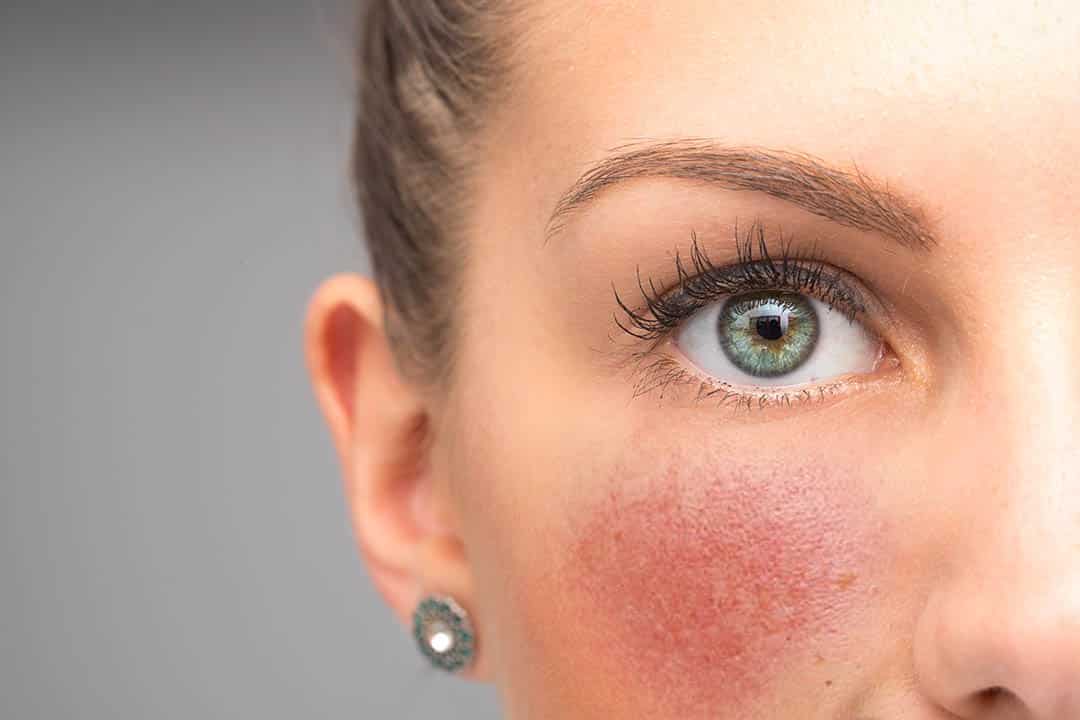
Dry winter skin is a problem for all Australians, but is especially troublesome for those who have rosacea. Ingredients typically touted for their soothing or moisturising properties can actually be detrimental to this inflammatory skin condition. At Austin Clinic, our skin experts have the training to guide patients to products that help, rather than exacerbate rosacea.
Alcohol: Drink It, Don’t Bathe in It
The alcohols in skincare products are used to cut through oil and make active ingredients soluble. Unfortunately, when drying alcohols are applied to the skin too often or in high concentrations, they can disrupt the moisture barrier, which leads to dryness, irritation, and rosacea flares. At Austin Clinic, patients looking to avoid drying alcohol due to rosacea are advised to stay away from products that contain:
- Ethanol
- Isopropyl Alcohol
- Denatured Alcohol
- SD Alcohols 40 and 38
Acids to Avoid if You Have Rosacea
The upside of acids in skincare has been well documented. Regrettably, the downside of glycolic, lactic, and salicylic acids is that they are too harsh to use on skin with rosacea. If your skin is not compromised, acids will likely make it tingle. If you have rosacea, you are literally pouring acid on already inflamed skin.
Lighten Up, But Not with Hydroquinone
Hyperpigmentation, especially due to sun exposure, is particularly challenging for our patients with rosacea. Hydroquinone is a frequently prescribed skin-lightener, but it can cause irritation in patients whose skin is sensitive. Oral medications and laser treatments may be a better choice for treating sunspots and discolouration.
Find a Better Way to Smell Good
Fragrances make products smell good, but they can make psoriasis-plagued skin feel horrible. Fragrances tend to be drying, including many natural fragrances so, “Look for fragrance-free products,” advises Dr Austin. She adds, “You can still smell lovely if you apply your scent to your clothing rather than directly on your skin.”
WHO Is in a Lather Over SLS in Soap and Elsewhere
Sodium lauryl sulphate is used in skincare in Australia in health and beauty products like toothpaste, shampoo, and soap. The World Health Organisation has raised concerns regarding its oil and skin-stripping properties and SLS was banned in the EU for being a skin irritant. Though it may make skin more permeable, it is definitely known to aggravate rosacea, acne, and other sensitive skin conditions.
Watch Out for Witch Hazel
You’ve undoubtedly seen bottles of witch hazel at the pharmacy. It is a go-to remedy for people who want the astringent power of witch hazel’s tannins. “Tannins compress proteins, which creates a kind of film over the skin which, in turn, temporarily de-greases skin,” explains Dr Austin. It should not be used as a skincare product if you have rosacea.
If You Have Rosacea, Stay Away from These Ingredients Too
For most people, the common ingredients listed below present no threat to skin health or beauty:
- Camphor
- Menthol
- Urea
- Certain oils, including peppermint and eucalyptus
“Skincare is a highly personalised area of aesthetics,” says Dr Austin. “That means what may be problematic or helpful for one patient may not work for another.” She acknowledges that trial and error can be frustrating (and painful). She urges patients suffering with rosacea to contact the clinic for specialised, personalised care.
Beautiful Skin for Rosacea Sufferers
Winter is a good time to visit Austin Clinic and the Sanctuary for season-centric treatments and use-at-home products to ensure that you, not your rosacea, are in charge of your skin’s beauty. Contact us for guidance, support, and an in-person consult.